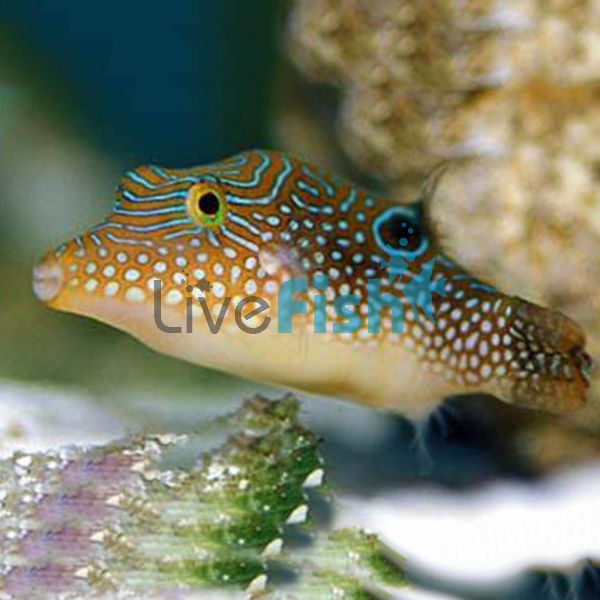Puffer Benett's MED
The Bennet’s Pufferfish is adorned with a colourful array of spots and bars. Its unusual pattern gives it a unique, eye-catching appearance.
The Bennet's Pufferfish is a mixture of light and dark grey on its upper body and pearly white on the lower body. Its novel appearance is a result of the bright pattern which is scattered across it. An assortment of orange and turquoise spots and bars brighten it up immensely. There is a black mark below the dorsal fin which is surrounded by a turquoise trim. Similar coloured lines also radiate out from the eye. This species has a symbiotic relationship with certain bacteria such as Pseudoalteromonas tetraodonis. As a result, the neurotoxin tetrodotoxin can be found in its skin and organs. It is a sturdy defence against predators as tetrodotoxin is 100 times more potent than cyanide.
There are no reports of breeding in captivity. In the wild, they group together in a huge shoal to spawn one or two times per year. Eggs are dispersed over over areas of coral and rubble.
The Bennet's Pufferfish is from the Indo-Pacific. It is found in locations such as East and South Africa, Taiwan, Japan, Indonesia, Australia, and Fiji. In the wild, it usually inhabits lagoons and reefs around weeds, rubble or sandy areas. The normal depth range is between 1-15 metres.
Tank Recommendations for the Bennet's Pufferfish
The Bennet's Pufferfish requires a tank size of at least 50 gallons (189.2 litres).
Caution is advised if housing it in a reef environment as it may consume invertebrates. It is better suited to a fish-only tank which wouldn't put corals or invertebrates at risk. Live rock with crevices and caves for hiding is recommended as well as open space for swimming.
There is a possibility that Bennet's Pufferfish may release a toxin into the tank. This can occur when they are stressed. It may be the reason that they are not a common choice of pet for aquarists.
Suitable Tank Buddies
The Bennet's Pufferfish has a peaceful temperament. However, some specimens may nip at long-finned species, leaving holes in their fins.
It can also show aggression to other fish in the Canthigaster genus. If keeping more than one it is advisable to have a mated pair.
Usually Compatible
Suitable tank buddies include Angelfish, Anthias, Blennies, Foxface/Rabbitfish, Hawkfish, and Tangs.
Sometime Compatible
Conspecifics are only suitable if they are a mated pair. Even under these circumstances, the male may need monitoring for signs of aggression. Care should also be taken with Frogfish, Basslets, Boxfish, Dartfish, Groupers, and Triggerfish.
Rarely Compatible
This species should not cohabit with more aggressive species of Angelfish and Triggerfish. Groupers, Dottybacks, Sharks and Rays should also be avoided. Bennet's Pufferfish is a threat to invertebrates and corals. It is also an unsuitable tank buddy for Seahorses and Pipefish.
Feeding Your Bennet's Pufferfish
The Bennet's Pufferfish is an omnivore. It will consume a mixture of vegetable matter and meaty food. A suitable diet should include krill, squid, hard-shelled shrimp, fish, and nori seaweed. It will also graze on a variety of algae, and live rock. Feeding should consist of small portions three times per day.
| Scientific Name | Canthigaster bennetti |
|---|---|
| Care Level | Moderate |
| Common Names | The Bennet’s Pufferfish, The Bennet’s Sharpnose Puffer, Whitebelly Pufferfish, Exquisite Toby, Bennet’s Toby, Black-spot Toby, Brownback Toby |
| Diet | Omnivore |
| Fish Family | Tetraodontidae |
| Lifespan (years) | 7 |
| Max. Length (cm) | 10 |
| Min. Tank Volume (l) | 189 |
| Origin | Indo-Pacific; East and South Africa, Taiwan, Japan, Indonesia, Australia, and Fiji |
| Reef Safe | With Caution |
| Sociability | Peaceful |
| Venomous | Yes |
| Water Conditions | 22.2 – 25.6°C (72 - 78°F), dKH 8-12, pH 8.2-8.5, sg 1.020-1.025 |




